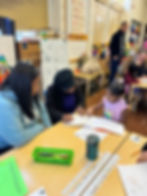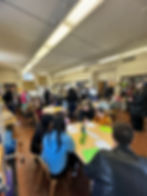

OUR CURRICULUM
MSC is in the final candidacy stage to become an International Baccalaureate (IB) World School - the #1 global curriculum. As an IB world school, our students will develope into inquiring, knowledgeable, confident, and caring young people.
IB ignites our core curriculum into an interdisciplinary framework, emphasizing the study of artistic communication and language arts as well as technological, mathematical and scientific inquiry skills. It is designed to help students develop the skills necessary to participate as informed and responsible citizens in a rapidly changing world.
CORE THEMES
The core curriculum integrates City and State standards into daily inquiry-based learning. This means that children’s work balances hands-on exploration with skill acquisition in a variety of subjects.

Foundational Literacy Skills
In K-2, we use Wilson FUNdations, a research-based, structured literacy program aligned with the science of reading. Through engaging, multi-sensory lessons, it builds core skills in reading, spelling, and handwriting.

Language & Literature K-5
Wit & Wisdom is the reading curriculum. It brings rich, authentic texts and artworks into the classroom so students build real-world knowledge as they grow into confident readers and writers. Students practice reading, writing, speaking, listening, and vocabulary together in coherent units that explore history, science, and the arts—encouraging deep thinking and clear communication. For the early grades, Wit & Wisdom is designed to pair with an explicit foundational-skills (phonics) program and Geodes® books, creating a complete path from learning to read to reading to learn.

Language & Literature 6-8th
Imagine Learning's EL Education is the reading curriculum for middle school. It's a rigorous, standards-based program that inspires students through real-world content and meaningful learning. Designed to support academic growth, character development, and high-quality work, the curriculum integrates equity-focused practices, Universal Design for Learning, and targeted supports for multilingual learners. With updated texts, streamlined teacher guides, and authentic performance tasks, this second edition equips educators to foster confident, capable learners ready to contribute to a better world.

Math
We use Illustrative Mathematics , a problem-based approach where students learn by solving meaningful, well-sequenced problems. In class, children collaborate, share strategies, and explain their thinking while teachers guide discussion and highlight the big ideas. This builds a strong, lasting understanding of concepts and procedures—and shows students how to apply math in new situations. Along the way, they practice clear communication (talking and writing about math), building confidence for later grades and real-world problem-solving.

Science & Greenhouse
Amplify Science is a K-8 science curriculum that blends hands-on investigations and interactive digital tools to empower students to think, read, write and argue like real scientists.
In addition to Amplify and in partnership with NY Sun Works, environmental science education is taught in our state-of-the art Greenhouse classroom that offers students the opportunity to grow food, while learning about nutrition, water resource management, efficient land use, climate change, biodiversity, conservation, contamination, pollution, waste management, and sustainable development. Our Greenhouse classroom includes hydroponic growing systems, a fish farm, a rainwater catchment system, a weather station, integrated pest management and a vermicomposting station.
SPOTLIGHT
OUR GREENHOUSE
Our Greenhouse curriculum introduces students to cutting-edge technology and connects science and the environment through sustainable urban farming, asking questions, investigating systems, making predictions and designing solutions. The curriculum emphasizes the child’s perspective in the process of learning and promotes project based, critical thinking, and collaborative work. Students not only learn the general requirements of the mandated New York State Science Standards and the Scope and Sequence Standards, they go beyond by addressing issues of today’s environmental global concern. Learn more about our Greenhouse partner below.









ADVANCED COURSES
All of our 8th grade students are eligible to take the Living Environment and Algebra I Regents, through our accelerated curriculum in our middle school grades.
FIELD TRIPS
Field trips are integral to our progressive curriculum by offering real-world experiences that broaden perspectives. They foster critical thinking and empathy, essential for students to become world-class citizens in our interconnected world. Each family is encouraged to contribute $30 per child to fund our field trips.
NYC MUSEUMS
-
The MET
-
American Museum of Natural History
-
New York Historical Society
-
Morgan Museum
-
Fraunces Tavern Museum
NYC ATTRACTIONS
-
Central Park Zoo
-
New York Aquarium
-
NY Botanical Garden
-
NY Public Library
-
Junior Achievement Financial Park
-
Local Farmer's Market
-
Local Food Pantry
OVERNIGHT TRIPS
-
Frost Valley, CT
-
Philadelphia
-
Washington, D.C.
CELEBRATIONS OF LEARNING
Publishing celebrations and student work showcases in each classroom community are celebrations of learning for children, their teachers and families. Publishing celebrations, are organized by the teachers after a unit of study. This is a culmination of all the work the students have learned throughout the course of the unit. Each child should be an active participant in the celebration—planning and organizing, sharing their work, listening and responding to the work of others. Likewise family members and staff should also be active participants. Teachers will establish a protocol that allows all students who have published to share and that also allows families to understand the importance of listening and responding.


















